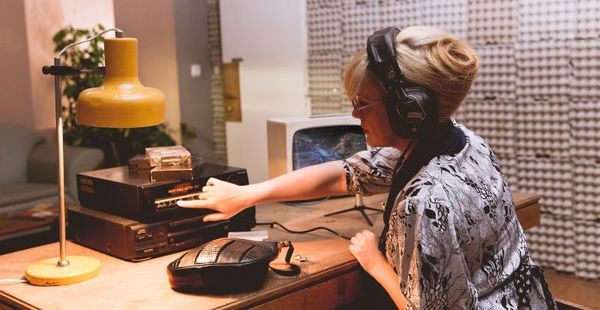Eye For Film >> Movies >> Chuck Norris Vs Communism (2015) Film Review
Chuck Norris Vs Communism
Reviewed by: Andrew Robertson

The first film I saw in the cinema was Michael Jackson's Moonwalker. It was an eighth birthday outing, not mine, still months away from that power of two. I cannot recall exactly which cinema but suspect a particular small one, perhaps then independently owned, now flats opposite a dentist beside a supermarket that's also changed hands. I remember nothing of the film directly, not Joe Pesci's maniacal hand-wringing, not the steel globe with its tarantular troposphere, not the claymation or the criminal smoothness. Later more conscious viewings have blurred what might have been original memory like archive footage super-imposed over a work-print, dimly, in the way that I remember watching Star Destroyers on fire off the shoulder of Yavin from the floor of my grandmother's house some Christmas where the Empire Struck Back or Jedi Returned on terrestrial television and I know that then they were new shapes and colours but now I know where Biggs went to school and who Arvel Crynd was and that Keonsayr are the power behind Gold Squadron (if you don't count match-move and compositing and dolly shots along painted glass) but then my cell walls were just beginning to absorb these bits by osmosis and now, hardened, I cannot say where I picked up the cultural jetsam and scarring that makes it clear why Mr Rockatansky is so pained even if you never knew the sprog's name.
In Chuck Norris Vs Communism we meet a woman whose first film was Last Tango In Paris'. Ceausescu's Romania, a difficult European notionally socialist hermit kingdom, a North Korea on the Med, a "culturally isolated" totalitarian state that was undone by three letters: V H S.

A Sony Trinitron samizdat of Western movies, distributed by a man called Teodor Zampir around whom, even now, rumours swirl; translated live, effectively, in direct VCR to VCR transcription with commentary injection by microphone by one woman, Irina Nistor, a legendary figure. A woman with whom unknowable audiences watched films for the first time, some three thousand of them. Three thousand sets of stories, three thousand faces for a hero, three thousand glimpses into a world from a place where two televison channels became one and that solitary beacon of state-controlled media broadcast for two hours a day.
The filmed reconstructions are sufficiently filmic that at times, with the pans across the brutalist architecture of the private spaces the state afforded its citizens and the crane shots and the men in uniforms and hats and Ladas or Tatras signed out of the motor pool, it is hard to tell what is Eighties VHS and what is beautifully constructed documentary impressionism. The movies, too - there is Chuck, old balsa wood himself, and Condorman, and the voiceover from Cyborg, and buried somewhere under a thicket of tracking, Blade Runner, and also interviews, people gathered to recall watching movies when that was defiance as well as a Saturday night, and those note-perfect reconstructions.
This is film as, not quite oral history, a film of film history, but a history of a particular time and place of film-watching, a documentary that gives an audience an audience. The essence of documentary, well demonstrated, find an interesting subject and tell the story well. This is it, this is the stuff, from the Brett Ratner production credit to the score by Anna Nikitin and Rob Manning to the Cannon films logo, the MGM lion from when we were kids, the spinning O in Orion.
At the end it's made clear that the reconstructions are dramatised from oral testimony, but by then it doesn't matter. This is a story. A story ably constructed and told by director Ilinca Calugareanu, whose short VHS Vs Communism is herein expanded, that detoured through a crowdfunding campaign that didn't make its target, and then to HBO Europe, and then to audiences.
You can and should watch this HBO documentary when and where you can. Audiences at EIFF 2015 will certainly enjoy it, but your reviewer watched it on a battered laptop set up on a chair as an online screener so it became hard to tell where video artifacts ended and the processor demands of overzealous firewall or temporary Wi-Fi degradation began and that felt right.
It says 'film' right up there, on your computer or mobile device, and multiplex and IMAX and velvet curtain and live musical accompaniment have the best of it but small screen and movies have a special relationship. Home taping killed the record industry and tape after tape after tape played a big part in a revolution and Chuck Norris Vs Communism gets it, all of it. The notion of fighting censorship by the state but bowdlerising swearing, the parallels between other forms of smuggling and the way the quality of a product degrades at each step through the distribution chain, the realisation of the alien - at that eighth birthday outing the trailer for Young Guns seemed sufficiently efficient an introduction that your larval reviewer thought it evidence of being in the wrong theatre - that's not [giving up] "following the film because you were so impressed with the houses". That's not watching Brazil in an actual dictatorship.
Fleming's Bond novels were a kind of tourism into the nascent jet-set; the first time we see 007's abode on screen the staggering gadget is not the titular Golden Gun but that in 1974 an English civil servant had an espresso machine in the kitchen. That's not it being an arrestable offence to own a piece of electromechanical engineering that in my house sits under a DVD player and a TiVo with a shadow cast in the dust by a Revell Easy-Model of a TIE Interceptor.
There are a couple of minor niggles, the credits and titling are in a font that is clear and easy to read but just a little too new in feel, at the end all of those interviewed are identified with their names beside their faces but the dozens of film-clips don't get the same treatment, and there are presumably only a handful of locations that still look like 1989 in 2015, but these are only worth mentioning because everything else is so slick. This is worth seeing, in a friend's house at a video night, on HBO Romania if you have access, in a cinema if you can, but see it, spread the word. Unlike the films it depicts this is one you can talk about in front of people who haven't seen it, and I am doing so because you should.
Reviewed on: 16 Jun 2015If you like this, try:
Electric Boogaloo: The Wild, Untold Story Of Cannon FilmsThe Lives Of Others
Rewind This

















